Austria in the Eurovision Song Contest
| Austria | |
|---|---|
 | |
| Member station | ORF |
| National selection events |
Internal Selection
National Final
|
| Participation summary | |
| Appearances | 51 (47 finals) |
| First appearance | 1957 |
| Best result | 1st: 1966, 2014 |
| Worst result |
Last: 1957, 1961, 1962, 1979, 1984, 1988, 1991, 2012 SF Nul points: 1962, 1988, 1991, 2015 |
| External links | |
| Austria's page at Eurovision.tv | |
|
Austria in the Eurovision Song Contest 2018 | |
Austria has participated in the Eurovision Song Contest 51 times since its debut in 1957. The country has won twice, in 1966 and 2014, and currently holds the record for the longest gap between wins, with 48 years between victories. The contest is broadcast in Austria by ORF. Vienna was the host city on both of the occasions that the contest was held in Austria, in 1967 and 2015.
Having finished sixth at the 1964 contest and fourth in 1965, Udo Jurgens won at his third attempt in 1966 with the song "Merci Chérie". This was Austria's only top three result of the 20th century. Austria won again in 2014, with Conchita Wurst and "Rise Like a Phoenix". Austria has finished last in the contest final seven times (1957, 1961, 1962, 1979, 1984, 1988 and 1991) and finished last in the semifinal in 2012. Cesár Sampson achieved Austria's eighth top five result and second-best result of the 21st century at the 2018 contest, finishing third with the song "Nobody But You".
History
Austria finished last at its first attempt in the contest in 1957, before Liane Augustin gave the country the first of its eight top five results in 1958, with fifth. Having finished sixth in 1964 and fourth in 1965, Udo Jürgens won the contest at his third attempt in 1966. This would be Austria's only top three result of 20th century. The country's best result over the next 46 years (1967–2013) would be fifth place, which it achieved with Milestones in 1972, Waterloo & Robinson in 1976 and Thomas Forstner in 1989. Austria has finished last in the final a total of seven times, in 1957, 1961, 1962, 1979, 1984, 1988, 1991. The country also finished last in the semi-final in 2012. Austria's best result of the 1990s was four tenth-place finishes, in 1990, 1992, 1996 and 1999. Austria's best result of the 2000s was Alf Poier's sixth-place in 2003, which was Austria's best placement since 1989.
After a three-year absence, ORF announced on 28 July 2010 that Austria would return to the contest in 2011,[1][2] where the country reached the final for the first time since 2004, finishing 18th.
Austria achieved its second victory in the contest at the 2014 contest, with Conchita Wurst winning with 290 points.[3] In a complete reversal of fortunes in 2015, following a tie-break rule Austria was placed 26th and scored nul points along with Germany (27th), they became the first countries since the United Kingdom in 2003 to score nul points at the final. Because of this, Austria became the first host country to receive nul points. Austria has qualified for the final every year since, finishing 13th in 2016 and 16th in 2017. Austria's third Top 3 result came in 2018, with "Nobody but You" by Cesár Sampson finishing third in Lisbon, the country's third-best result in the history of the contest.
Absences
Austria has opted out of participation in several Contests. The first of these was the 1969 Contest, which was staged in Madrid. As Spain was ruled at that time by Francisco Franco, Austria chose to boycott the Contest. Contest historian John Kennedy O'Connor points out, however, that Austria had given Spain two points in the previous event and since Spain only won by one point, the political protest was perhaps disingenuous.[4]
The following year, Austria was again absent. This was due to the unprecedented result in 1969 in which four songs tied for first place, a result which prompted several other countries to opt out as well.[4]
From 1973 to 1975, Austria stayed away as well. The exact reason for this is unclear, however the scoring system in use at one of these Contests - allowing all entrants a guaranteed number of points - may have been a factor.
The country was ineligible to compete in 1998 and 2001, as it had not achieved sufficiently high placings in the five previous years.[4]
Prior to the 2006 contest, Austria announced that they would not enter a performer in protest at their poor results in previous years, arguing that the musical talent of the performers was no longer the determining factor in Contest success.[5][6] They returned for the 2007 contest in Helsinki, but came second to last in the semi-final. National broadcaster ORF cited the 2007 result, as well as declining interest in the Contest among Austrian viewers, as the reason Austria would not return to the contest in 2008. ORF programme director Wolfgang Lorenz also hinted that Austria may withdraw from the contest indefinitely, stating "ORF has no desire to send more talent out of Austria to a competition where they have no chances...Should the situation change, we'll be happy to take part again". [7] Despite withdrawing, the final of the 2008 contest was screened on ORF.[8]
However, Edgar Böhm, director of entertainment for ORF, said that the semi-final format "still incorporates a mix of countries who will be politically favoured in the voting process" and "that, unless a clear guideline as to how the semifinals are organised is made by the EBU, Austria will not be taking part in Moscow 2009".[9] ORF decided not to participate in the 2009 contest, but did broadcast the final as in 2008.[10] The EBU announced that they would work harder to bring Austria back to the contest in 2010, along with former participants Monaco and Italy.[11] It was, however, confirmed that Austria would not participate in the 2010 Contest in Bærum.[12] In July 2010, the chairman of ORF, Alexander Wrabetz, stated that Austria would return for the 2011 contest, due to it being held in its neighbour Germany.[1][2][13] In 2011, Austria reached the final for the first time since 2004.
Contestants
- Table key
- NOTES:
- 1. ^ Specifically Styrian, a Southern Bavarian dialect spoken in Styria.
- 2. ^ Specifically Mühlviertlerisch, a Central Bavarian dialect spoken in Upper Austria.
- 3. ^ While Austria and Germany both finished with no points, Austria is listed as finishing "ahead" of Germany due to the tiebreaker rule that favours the song performed earliest in the running order. Therefore, Germany finished in 27th (last) place, with Austria in 26th.[15]
- 4. If a country had won the previous year, they did not have to compete in the semi-finals the following year. In addition, back in 2004-2007, the top ten countries who were not members of the big four did not have to compete in the semi finals the following year. If, for example, Germany and France placed inside the top ten, the countries who placed 11th and 12th were advanced to the following year's grand final along with the rest of the top ten countries.
Conductors
All conductors are Austrian except those marked with a flag.
- Carl de Groof (1957)
- Willy Fantel (1958)

- Robert Stolz (1960)
- Bruno Uher (1962)
- Erwin Halletz (1963)
- Johannes Fehring (1964, 1967) (musical director in 1967)

- Hans Hammerschmid (1966)
- Robert Opratko (1968, 1971)
- Erich Kleinschuster (1972, 1976)
- Christian Kolonovits (1977, 1993)
- Richard Österreicher (1978–1987, 1990–91)
- Harald Neuwirth (1988)
- Leon Ives (1992)

- Michael F. Kienzl (1995)
- Mischa W. Krausz (1996)
Prior to 1999, the Austrian entry was performed without orchestral accompaniment in 1989 and 1997.[16]
Voting history
As of 2018, Austria's voting history is as follows:
|
| ||||||||||||||||||||||||||||||||||||||||||||||||||||||||||||||||||||||||||||||||||||
Hostings
| Year | Location | Venue | Presenter |
|---|---|---|---|
| 1967 | Vienna | Großer Festsaal der Wiener Hofburg | Erica Vaal |
| 2015 | Wiener Stadthalle | Mirjam Weichselbraun, Alice Tumler and Arabella Kiesbauer |
Awards received
Marcel Bezençon Awards
The Marcel Bezençon Awards were first handed out during the Eurovision Song Contest 2002 in Tallinn, Estonia, honouring the best competing songs in the final. Founded by Christer Björkman (Sweden's representative in the 1992 Eurovision Song Contest and the current Head of Delegation for Sweden) and Richard Herrey (a member of the Herreys and the Eurovision Song Contest 1984 winner from Sweden), the awards are named after the creator of the annual competition, Marcel Bezençon. The awards are divided into three categories: Press Award, Artistic Award, and Composer Award.[17]
| Year | Category | Song | Performer(s) | Composer(s) |
|---|---|---|---|---|
| 2014 | Press Award | "Rise Like a Phoenix" | Conchita Wurst | Charley Mason, Joey Patulka, Ali Zuckowski, Julian Maas |
OGAE
Organisation Générale des Amateurs de l'Eurovision (more commonly known as OGAE) is an international organisation that was founded in 1984 in Savonlinna, Finland by Jari-Pekka Koikkalainen.[18] The organisation consists of a network of 40 Eurovision Song Contest fan clubs across Europe and beyond, and is a non-governmental, non-political, and non-profit company.[19]
| Year | Song | Performer(s) | Composer(s) | OGAE place | OGAE result |
|---|---|---|---|---|---|
| 2014[20] | "Rise Like a Phoenix" | Conchita Wurst | Charley Mason, Joey Patulka, Ali Zuckowski, Julian Maas | 4 | 221 |
Commentators
Between the 1970 Contest and the 1998 Contest every contest was commentated by Austrian radio journalist and actor Ernst Grissemann, with the exception of the 1979 Contest and the 1990 Contest. Grissemann admitted to future German commentator Peter Urban in 1995 that he only stayed for the dress rehearsal and then provided the Austrian commentary live from the ORF studios.[21] After 1998 Grissemann stepped down from the commentary and was replaced by Andi Knoll. Austria has also broadcast the contests where it was not competing, except for the 2010 contest.
| Year(s) | Television commentator | Radio commentator | Spokesperson |
|---|---|---|---|
| 1957 | Commentary via ARD Germany between 1957 and 1963 | No radio broadcast | Karl Bruck |
| 1958 | |||
| 1959 | |||
| 1960 | Emil Kollpacher | ||
| 1961 | |||
| 1962 | |||
| 1963 | |||
| 1964 | Willy Kralik | Walter Richard Langer | |
| 1965 | |||
| 1966 | |||
| 1967 | Emil Kollpacher | ||
| 1968 | Willy Kralik | ||
| 1969 | Did not participate | ||
| 1970 | Ernst Grissemann | ||
| 1971 | Hubert Gaisbauer | No Spokesperson | |
| 1972 | |||
| 1973 | No radio broadcast | Did not participate | |
| 1974 | |||
| 1975 | |||
| 1976 | Hubert Gaisbauer | Jenny Pippal | |
| 1977 | |||
| 1978 | Walter Richard Langer | ||
| 1979 | Max Schautzer | ||
| 1980 | Günther Ziesel | ||
| 1981 | Ernst Grissemann | ||
| 1982 | Tilia Herold | ||
| 1983 | Rudolf Klausnitzer | ||
| 1984 | No radio broadcast | ||
| 1985 | Walter Richard Langer | Chris Lohner | |
| 1986 | Hans Leitinger | Tilia Herold | |
| 1987 | |||
| 1988 | |||
| 1989 | |||
| 1990 | Barbara Stöckl | Walter Richard Langer | |
| 1991 | Herbert Dobrovolny | Gabriele Haring | |
| 1992 | Ernst Grissemann | Martin Blumenau | Andy Lee |
| 1993 | |||
| 1994 | Tilia Herold | ||
| 1995 | Stermann & Grissemann | ||
| 1996 | Martina Rupp | ||
| 1997 | Adriana Zartl | ||
| 1998 | Did not participate | ||
| 1999 | Andi Knoll | Dodo Roščić | |
| 2000 | |||
| 2001 | Did not participate | ||
| 2002 | Dodo Roščić | ||
| 2003 | Martin Blumenau | ||
| 2004 | |||
| 2005 | |||
| 2006 | No radio broadcast | Did not participate | |
| 2007 | Eva Pölzl | ||
| 2008 | Did not participate | ||
| 2009 | Benny Hörtnagl | ||
| 2010 | No broadcast | ||
| 2011 | Andi Knoll | Martin Blumenau & Benny Hörtnagl | Katharina Bellowitsch |
| 2012 | Stermann & Grissemann | ||
| 2013 | No radio broadcast | ||
| 2014 | |||
| 2015 | |||
| 2016 | |||
| 2017 | Kristina Inhof | ||
| 2018 | Katharina Bellowitsch |
Photogallery
See also
- Austria in the Eurovision Choir of the Year – A competition organised by the EBU for non-professional choirs.
- Austria in the Eurovision Dance Contest – Dance version of the Eurovision Song Contest.
- Austria in the Eurovision Young Dancers – A competition organised by the EBU for younger dancers aged between 16 and 21.
- Austria in the Eurovision Young Musicians – A competition organised by the EBU for musicians aged 18 years and younger.
References
- 1 2 Klier, Marcus (27 July 2010). "Austria will return to Eurovision in 2011". ESCToday. Retrieved 27 July 2010.
- 1 2 "Song Contest: Österreich tritt 2011 wieder an" (in German). ORF. 2010-07-27. Retrieved 27 July 2010.
- ↑ "Austria wins Eurovision Song Contest". BBC News. 11 May 2014. Retrieved 11 May 2014.
- 1 2 3 O'Connor, John Kennedy (2005). The Eurovision Song Contest: The Official History.
- ↑ Philips, Roel (18 June 2005). "Austria withdraws from 2006 Eurovision Song Contest". Retrieved 10 December 2006.
- ↑ Philips, Roel (20 June 2005). "Austrian Broadcaster explains withdrawal". Retrieved 12 December 2006.
- ↑ Holyer, Steve (20 November 2007). "Austria will not go to Belgrade". Retrieved 20 November 2007.
- ↑ Klier, Marcus (2 January 2008). "ORF likely to broadcast Eurovision Song Contest 2008". Retrieved 1 March 2008.
- ↑ Kuipers, Michael (3 June 2008). "Austria: ORF will decide in the Autumn". ESCToday. Retrieved 3 June 2008.
- ↑ Klier, Marcus (18 September 2008). "Austria: No return to Eurovision in 2009". ESCToday. Retrieved 18 September 2008.
- ↑ Floras, Stella (13 January 2009). "EBU working for Eurovision full house in 2010". ESCToday. Retrieved 30 July 2009.
- ↑ Klier, Marcus (22 September 2009). "Confirmed: Austria will not take part in 2010". ESCToday. Retrieved 21 September 2016.
- ↑ Wrabetz, Alexander (2010-05-31). "Wrabetz will ORF-Antreten "sicher überdenken"" (in German). derstandard.at. Archived from the original on 5 June 2010. Retrieved 2010-06-01.
- ↑ Bild: ORF. "Auch Österreich wird zum begeisterten Song-Contest-Land". Nachrichten.at. Retrieved 2014-05-14.
- ↑ "Rules for the Eurovision Song Contest 2009" (PDF). European Broadcasting Union. Retrieved 18 July 2009.
- ↑ http://andtheconductoris.eu/
- ↑ "Marcel Bezençon Award – an introduction". Poplight.se. Archived from the original on 17 October 2013. Retrieved 15 July 2012.
- ↑ OGAE (15 June 2012). "Eurovision Fanclub Network". ogae.net. OGAE. Retrieved 15 June 2012.
- ↑ "Klubi-info: Mikä ihmeen OGAE?" [The club info: What on Earth is OGAE?] (in Finnish). OGAE Finland. 5 June 2012. Retrieved 17 June 2012.
- ↑ OGAE International (28 April 2014). "OGAE 2014 Results". OGAE. Retrieved 28 April 2014.
- ↑ "Begegnung in der Box | Das Erste: Eurovision Song Contest - News - Mein Grand Prix". Eurovision.de. 2011-05-14. Retrieved 2014-05-14.
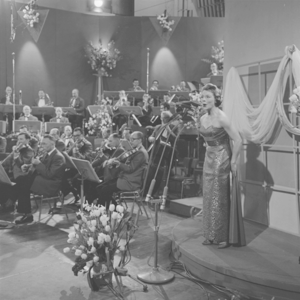



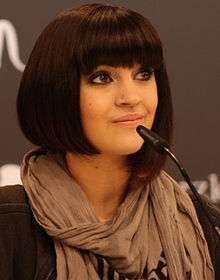
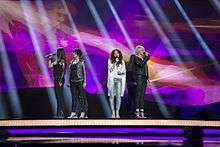
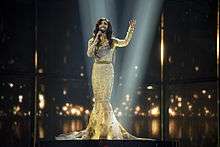
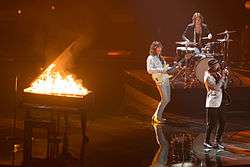
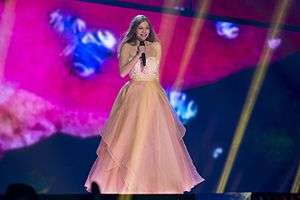

.jpg)